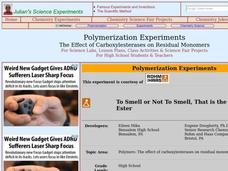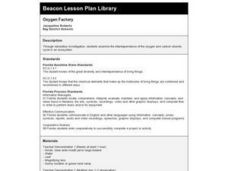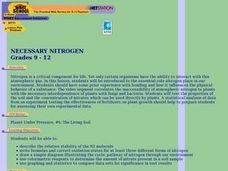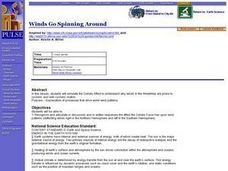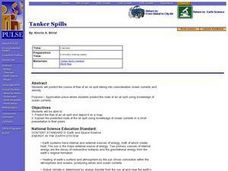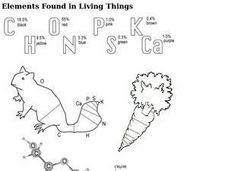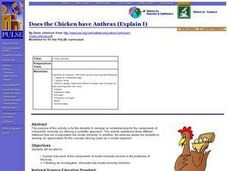Curated OER
To Smell or Not to Smell, That is the Ester
Students explain the basic concepts of polymerization. Students participate in a lab to create a crude preparation of carboxyl esterase and test its effectiveness in reducing the residual monomer in an emulsion such as paint.
Curated OER
Giants of the Protozoa
Students describe and define xenophyophores. In this protozoa lesson students divide into groups and complete a lab activity.
Curated OER
Polymerization Experiments
High schoolers explain the process of polymerization. In this chemistry lesson, students produce carboxylesterase in the lab. They test its effectiveness in removing the by-product odor.
Curated OER
Science: What Is the Carbon Cycle?
Students examine the carbon cycle while identifying its sources, sinks, and release agents. Using magazines and newspapers, groups of students design collages illustrating the carbon cycle. Finally, they write responses to several...
Curated OER
Animals of the Fire Ice
Students study ice worms and describe how they interact with other species. In this methane hydrate lesson plan students study ice worms and hydrate shrimp to learn their behavior and can participate in an optional activity.
Curated OER
Kernel Power" Ethanol Fuel from Corn
Learners study why corn is a biodegradable, renewable resource. In this ethanol lesson students build models and observe a chemical reaction.
Curated OER
Oxygen Factory
Fourth graders examine the interdependence of the oxygen and carbon dioxide cycle in an ecosystem through a laboratory investigation. After a lecture/demo, 4th graders complete the lab in groups.
Curated OER
The Nature Of Dissolving Processes
Students examine the rule of "like dissolves like." They define and describe solutions and solubility models on molecular liquids, ionic solids, and molecular solids.
Curated OER
Working with Tenses
in this working with tenses activity, students identify time expressions in sentences. Students then determine the tense of each of the verb phrases and create new sentences.
Curated OER
Necessary Nitrogen
Students view a video that presents the biogeochemical cycle of nitrogen. They compare types of soils and consider how different fertilizers affect soil composition.
Curated OER
What's the Big Deal?
Learners define terms and describe where they are found and formed. In this methane lesson students complete an activity and describe ways in which methane hydrates impact our lives.
Curated OER
Sea State
Learners explain the process of wave formation and analyze the relationship between the ocean and the atmosphere. In this oceans lesson students use buoys to cast real time sea state conditions.
Curated OER
Look At Those Leaves!
Students observe, measure and sort leaves. For this leaf lesson students divide into groups and observe the different kinds of leaves.
Curated OER
How do plant & animal cells make and use energy?
Students show the relationship between the need for plants to undergo photosynthesis in order to generate oxygen. They see the flaws associated with this thinking because of the lack of CO2 and H2O and lack of sufficient gravity in order...
Curated OER
Winds Go Spinning Around
Students simulate the Coriolis Effect to comprehend why winds in the Westerlies are prone to cyclonic and anti-cyclonic motion. They arrive at an explanation of processes that drive world wind patterns
Curated OER
Tanker Spills
Students predict the flow of an oil spill and depict it on a map. They explain the predicted route of the oil spill using knowledge of ocean currents in a short presentation to their peers.
Curated OER
Elements Found in Living Things
For this elements worksheet, students review the most common elements found in living things. Students color in two pictures with the percentages of the elements found in that living thing.
Curated OER
Does the Chicken have Anthrax (Explain I)
Students explain how each of the components of innate immunity function in the protection of the body. Following an investigation, they articulate how innate immunity functions.
Curated OER
Moore S Word Search Puzzle 1
In this literacy worksheet, middle schoolers find the words that are in the word search puzzle that focus upon the vocabulary that is from the theme of the sheet.
Curated OER
Science Word Search
In this science instructional activity, students locate and identify various vocabulary terms related to earth science. There are 44 words/phrases located in the puzzle.
Curated OER
Putting on Mass: Just how do Trees grow?
High schoolers articulate an explanation of photosynthesis. They identify problems they have with comprehension of how a plant gains mass. Students describe a historical experiment.
Curated OER
It's the Slime Time
Students experiment to understand the basic concept of polymerization and to understand the dissolution theory. Student experiment with polymers to understand its behavior and the mechanical behavior of polymer networks.
Curated OER
Urban Impact on Chollas Creek (California): A Field Study
Students, in groups, take samples from a creek and keep a field journal on their samples. They also perform tests on their samples.
Curated OER
Ions in the Environment
Students explain the importance of the five main biogeochemical cycles. In this chemistry lesson, students discuss how ions are transported in the environment. They design an experiment to collect data on eutrophication.




